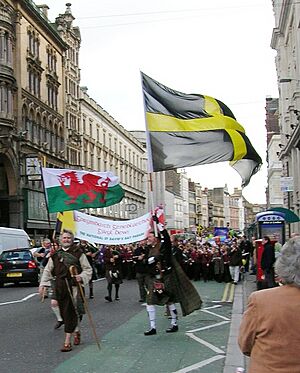British National Day facts for kids
British National Day is an idea for a special day to celebrate the United Kingdom and what it means to be British. Right now, the UK doesn't have one official national day. However, the King's Official Birthday is sometimes used for this purpose, especially by British diplomats in other countries.
Contents
Why No Single National Day?
The UK is made up of four different countries: England, Scotland, Wales, and Northern Ireland. Each of these countries has its own special day to celebrate its patron saint:
- Saint George's Day in England
- Saint Andrew's Day in Scotland
- Saint David's Day in Wales
- Saint Patrick's Day in Northern Ireland
These days are often celebrated more within their own countries. Because of this, the UK doesn't have one single day that everyone across all four countries celebrates as a national holiday.
Ideas for a British Day
Many different dates have been suggested for a possible British National Day. Some of these are already existing holidays or important historical dates. Here are a few of the ideas:
- 1 May: This is May Day, and it's also the date when the Acts of Union 1707 officially joined England and Scotland to create Great Britain.
- VE Day (8 May): This day marks the end of World War II in Europe.
- D-Day (6 June): This remembers the huge Allied invasion of Normandy during World War II.
- Magna Carta Day (15 June): This date celebrates the signing of an important legal document in 1215 that limited the power of the king.
- The King's Official Birthday: This is a Saturday in June chosen to celebrate the King's birthday, even though his actual birthday might be on a different day.
- Armistice Day (11 November): This day marks the end of World War I.
- Remembrance Sunday: This is the Sunday after Armistice Day, when people remember those who died in wars.
Why Some People Don't Like the Idea
Not everyone agrees that the UK needs a new British National Day. Some people, especially in Wales, Scotland, and Northern Ireland, feel that their existing national days are more important.
For example, in Wales, many people and politicians want St David's Day (1 March) to be a bank holiday. A survey showed that 87% of people in Wales supported this idea. All 60 members of the National Assembly for Wales (now called the Senedd) voted for it to become a bank holiday. However, the UK government said it wasn't practical to add another public holiday.

Some politicians in Wales have said that creating a new British Day feels like an attempt to make everyone feel "British" instead of celebrating their Welsh, Scottish, English, or Northern Irish identities. They point out that St Patrick's Day is already a bank holiday in Northern Ireland, and the Scottish Parliament made St Andrew's Day a bank holiday in Scotland in 2007. This shows that different parts of the UK have different ideas about national celebrations.
British Day in Germany
Interestingly, there has been a "British Day" celebration in Hamburg, Germany, for many years. It started in 1991 and is now called "British Flair." This event often includes a "Proms" concert, where people wave Union Flags and sing British patriotic songs. This tradition goes back to the 18th century when the British royal family also ruled the German region of Hanover.
Also, the city hall in Karlsruhe, Germany, raises the flag of EU member countries on their national day. For the UK, they used to hoist the flag on 21 April, which is the actual birthday of Queen Elizabeth II.

